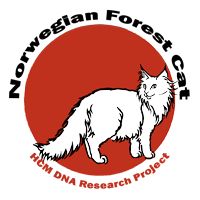
Norwegian Forest Cat HCM DNA Research Project

NFC HCM DNA Research Study Being Conducted in Sweden
Announced March 2011
HCM study – please, help!
As
you probably know, genetics have already searched for causative mutations of HCM
in Maine Coon and Ragdoll cats. One such mutation has so far been established in
each breed. Despite this, we still know little about the causes of this disease
– we need more research!
A
new interesting method for mapping genes that cause diseases in cats has been
developed. The procedure is to scan the entire DNA of a number of cats that have
the disease, as well as a number of cats who are clear of the disease. The cats
that are compared should, initially, be from the same breed. The genomes are
then compared to find out what significant differences there are between the two
groups of cats. This method makes it possible to determine not only single
disease causing mutations, but several. Even polygenes may be found with this
method. Several diseases may be relevant for studies based on this method and
HCM is one of them.
With
the new method we are likely to learn a lot more about the genes responsible for
HCM in our cats. This will help researchers to better understand the
mechanisms behind the disease, which in turn makes it possible to determine new
strategies and treatment methods for cats with HCM. Hopefully, this will help us
prevent carriers of the causative mutation/mutations to develop the disease.
This
type of research could help us understand why some breeds may have an early or a
late onset of HCM compared to other breeds. Furthermore, this may help us
understand why some cats appear to have a more aggressive form of the disease
than other cats with HCM. We have a lot to gain from this type of research,
since it could make it possible for us breeders to, more efficiently, breed away
from a problem based on genetic testing of our cats.
In
addition to this study, we are working with Dr Kathryn Meurs in the United
States to indentify genes that cause HCM in the Norwegian Forest Cat. Dr Meurs
currently works at Washington State University on the Norwegian Forest Cat HCM
DNA Research Project and will be transitioning to the University of North
Carolina in June of 2011 where she will continue her research. Since the
Norwegian Forest Cat is more common in Europe than the US, Dr Meurs needs our
help in getting blood samples for this study. She is looking for Norwegian
Forest Cats over 8 years old that are negative for HCM as well any blood samples
of Norwegian Forest Cats who are positive for HCM, regardless of age. If there
is enough DNA in the blood for both studies, we will send part of the DNA to Dr
Meurs on your behalf along with any documentation she requires such as the
pedigree information on the cat.
3-4 ml EDTA blood is needed. Can be shipped at room temperature, but tube needs to be stirred at sampling to avoid coagulation. The identity of the cat should be checked and certified in the protocol by the veterinary. Please, mark the tube with the full registered name of the cat, as written above.
Paperwork:
Complete
the Biobank Consent Form - Download PDF form here
Include
a copy of the cats pedigree
Include
copy of recent HCM scan
Important, Please Read: Statement on HCM screenings by non-participating Pawpeds Health Program Cardiologists:
You may participate in the Swedish NFC HCM DNA Study even if your cardiologist is not participating the the Pawpeds Health Program. However, it is advised that you ask your cardiologist to join the Pawpeds Health Program.
There
is no cost involved in this, the focus is more on information gathering such as
a copy of their resume and information on the equipment they use for screening.
If your cardiologist is interested in becoming part of the Pawpeds
Health Program, please send an email to Misha
Peersmans at mcothedorsai@gmail.com
and she will contact him/her to discuss next steps. Please note that the
Pawpeds Health Program prefers cardiologists however if your radiologist has
additional training and/or expertise with heart disease, they may qualify to
participate in the program. If a radiologist is
interested in participating, please follow the same process and they will be
considered as well.
It is highly recommended that you ask your cardiologist/radiologist to become part of the Pawpeds Health Program because if there are any unknowns that come in on your results and the cardiologist/radiologist is not part of the Pawpeds Health Program, there is a possibility that your samples will not qualify for use in the study due to missing or unknown values. By asking your cardiologist/radiologist to participate, we will eliminate the inability to read the results submitted.
Please also note that if your test results are submitted for this study, they will not be shared in the public database on Pawpeds. As an extra precaution, we ask that you mark “Not for Public Use” on the form. If you do wish to share these results, please send them directly to Pawpeds. More information on this process can be found at www.pawpeds.com
Send
to:
Prof. Jens Häggström (Biobank)
Kliniska Vetenskaper
Kirurgi & Medicin, hund, katt och andra smådjur
Box 7054
SE-750 07 Uppsala
Sweden
We
would appreciate it if you could let one of the people listed below if you can
and want to participate in the program. This will help us to keep track of what
is on its way and how many more cats we need to track down.
Melissa Alexander, melissa@iwcats.com
Åsa Ohlsson, sleeping_crystal@yahoo.com
Ulrika Olsson, ulrika@pawpeds.com
Kind
regards,
---
Ulrika Olsson (PawPeds), Åsa Ohlsson (PawPeds), Melissa Alexander (NFC HCM DNA
Research Project), and Prof. Jens Häggström (SLU)